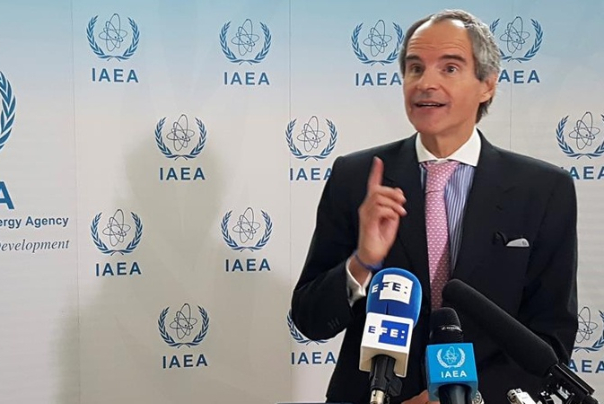
Grossi's visit to Iran is another opportunity for the IAEA to regain its role as an international organization. Iran has repeatedly stated that it has nothing to hide in the area of peaceful nuclear activities and is ready to cooperate with the IAEA.
NOURNEWS - During his visit to Iran, Rafael Grossi, Director General of the International Atomic Energy Agency, met with some Iranian officials, including the Minister of Foreign Affairs and the President of the Atomic Energy Organization.
Iran has had constructive cooperation with the IAEA since JCPOA, which has been acknowledged in 17 of IAEA official reports.
In the new term of the IAEA management, for some reasons, including the pressure of the White House and the Zionist regime on the IAEA, the behavior of this institution toward Iran has taken a political trend.
About three months ago, in a planned move, the IAEA submitted a surprising political report on Iran to the Board of Governors.
Following this report, in June of this year, the European Troika issued anti-Iranian resolutions alongside the United States.
Although Iran, emphasizing legal arguments, has not accepted the IAEA procedure in quoting the alleged documents of the Zionist regime, but due to its belief in cooperating with this international organization, has continued to keep the way for cooperation.
The Agency's new requests are legally inconsistent with the organization's manifesto and in a way call into question the principles of the IAEA Board.
While Europe's debts to Iran have not yet been assigned to JCPOA, and the United States has effectively rendered it ineffective by withdrawing from JCPOA, the IAEA has new requests.
This has transformed the Agency's position from an international legal institution to a political tool for pressuring independent states.
Grossi's visit to Iran is another opportunity for the IAEA to regain its role as an international organization.
Iran has repeatedly stated that it has nothing to hide in the area of peaceful nuclear activities and is ready to cooperate with the IAEA.
Iran has had constructive cooperation with the IAEA since JCPOA, which has been acknowledged in 17 of IAEA official reports.
In the new term of the IAEA management, for some reasons, including the pressure of the White House and the Zionist regime on the IAEA, the behavior of this institution toward Iran has taken a political trend.
About three months ago, in a planned move, the IAEA submitted a surprising political report on Iran to the Board of Governors.
Following this report, in June of this year, the European Troika issued anti-Iranian resolutions alongside the United States.
Although Iran, emphasizing legal arguments, has not accepted the IAEA procedure in quoting the alleged documents of the Zionist regime, but due to its belief in cooperating with this international organization, has continued to keep the way for cooperation.
The Agency's new requests are legally inconsistent with the organization's manifesto and in a way call into question the principles of the IAEA Board.
While Europe's debts to Iran have not yet been assigned to JCPOA, and the United States has effectively rendered it ineffective by withdrawing from JCPOA, the IAEA has new requests.
This has transformed the Agency's position from an international legal institution to a political tool for pressuring independent states.
Grossi's visit to Iran is another opportunity for the IAEA to regain its role as an international organization.
Iran has repeatedly stated that it has nothing to hide in the area of peaceful nuclear activities and is ready to cooperate with the IAEA.

No comments:
Post a Comment